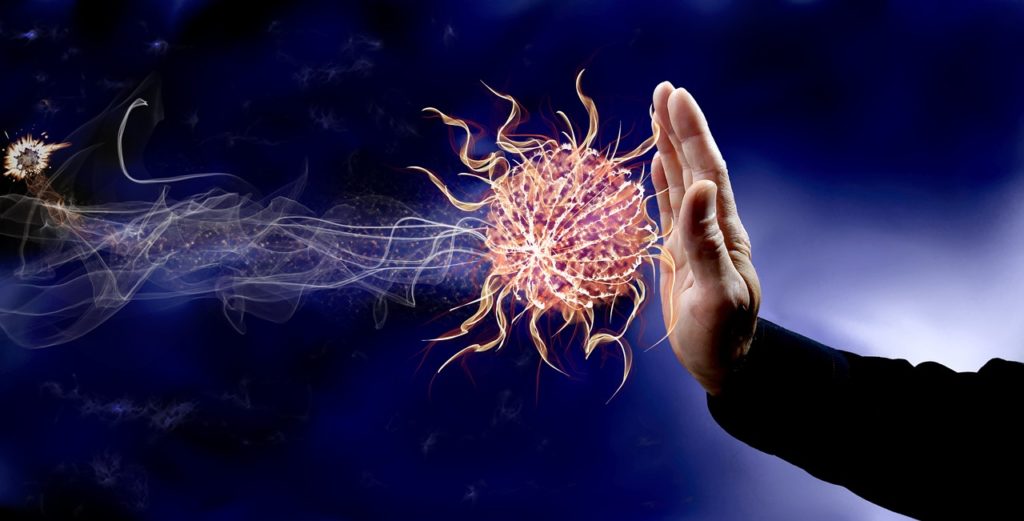A study published in 2017 by researchers from the University Medical Center Groningen in the Netherlands found that childhood experiences of trauma predict the development of anxiety and mood disorders in adolescence. The study, published in Nature, found this association to be connected with stress-related inflammatory markers, such as highly-sensitive-CRP (hsCRP), which indicate a compromise in the immune system.
“Activation of the immune system could be a pathway linking traumatic or stressful experiences to later onset of psychopathology,” the researchers write. “Stressful experiences early in life could lead to a chronic state of immune activation, which would increase the vulnerability for the development of psychiatric disorders.”

While there is a well-supported body of literature suggesting a link between the occurrence of childhood trauma and the development of mental health issues in adulthood, new research is attempting to discover the effect these traumatic childhood experiences have on the way the immune system develops. Further, this line of inquiry investigates the influence an altered immune system may have on one’s mental health throughout their life.
A recent study, published in the Lancet, provides mounting evidence that inflammation and altered immune response could play a significant role in the pathogenesis of psychological distress. The researchers explain:
“A possible explanation is that stress may cause activation of the immune system, which in turn could influence brain functioning and this could contribute to the development of psychiatric disorders.”
In the current study, researchers examined the role that exposure to childhood traumatic experiences has on an individual’s immune system and ultimately the development of psychiatric disorders. “Importantly, to date, no studies have prospectively assessed the link between childhood life events, the immune system and the development of various psychiatric disorders. Studying this association prospectively could give information on whether childhood life events may lead to a state of chronic low-grade immune activation and possible also impairment of the immune system.”
The study utilized the TRacking Adolescents’ Individual Lives Survey (TRAILS), a large sample population from the Netherlands. Four domains of trauma were assessed in over a thousand adolescents during an eight-year period: sexual abuse, physical abuse, verbal abuse, and separation trauma. Participants were evaluated every two years with a combination of self-report surveys to assess mental health and blood samples for biomarkers.
After four waves of analysis, researchers found that the presence of traumatic experiences before the age of 16 altered the immune function of these individuals and predicted the development of mood and anxiety disorders in participants at age 19. While the investigators cautioned that more research is needed on this topic, the study highlights the importance of life events in the development of adverse mental health outcomes.
These findings provide support to the growing body of literature linking childhood experiences with mental health outcomes. Future studies may help us to understand the far-reaching effects childhood trauma and highlight the importance of preventative measures in mental health care.
****
Jonker, I., Rosmalen, J. G. M., & Schoevers, R. A. (2017). Childhood life events, immune activation and the development of mood and anxiety disorders: the TRAILS study. Translational Psychiatry, 7(5), e1112. (Link)















I agree the “mental health industries” need to explain why “the prevalence of childhood trauma exposure within borderline personality disorder patients has been evidenced to be as high as 92% (Yen et al., 2002). Within individuals diagnosed with psychotic or affective disorders, it reaches 82% (Larsson et al., 2012).”
Especially given the reality that the treatments for these disorders, the antidepressants and/or antipsychotics, can actually create the symptoms of these serious DSM “mental disorders.” Particularly when wrongly given to a legitimately distressed child abuse victim, who is a crime victim, not a person with a brain disease.
https://www.alternet.org/story/146659/are_prozac_and_other_psychiatric_drugs_causing_the_astonishing_rise_of_mental_illness_in_america
https://en.wikipedia.org/wiki/Neuroleptic-induced_deficit_syndrome
https://en.wikipedia.org/wiki/Toxidrome
A pastor confessed to me that the historically paternalistic psychological and psychiatric industries, long ago, agreed to cover up the “zipper troubles” of the religious leaders and their wealthy, and the easily recognized iatrogenesis of the incompetent mainstream doctors, in exchange for being given undue credibility, while all profiteer from this agreement – psychiatry is now a multibillion dollar, primarily child abuse covering up, scientifically invalid industry. This pastor called this agreement “the dirty little secret of the two original educated professions.”
I’m pretty certain this “dirty little secret” is the actual reason why so many child abuse victims have been labeled with the DSM disorders. And I do have medical proof in medical records that when a person tells a psychiatrist that the medical evidence of the abuse of her child was just handed over. The first thing the psychiatrist wants to do is drug the child, even if he’s already largely healed from the child abuse. The second thing a psychiatrist wants to do is drug the legitimately concerned parent with all the antipsychotics.
Perhaps the “mental health professionals” should get out of the business of turning millions of child abuse victims into the mentally ill with the psychiatric drugs, and the police should start arresting the pedophiles instead?
I will say when a mother gets her child away from satanic pedophiles fairly quickly, and keeps her child away from the “mental health professionals.” An abused child, who went from a “school for gifted children” prior to the abuse, to remedial reading in the public school system after the abuse. With love and proper parenting that child can heal from the child abuse, become the valedictorian of his high school class, graduate from collage with the highest honors (Phi Beta Kappa), and even win psychology awards from the psychology department from which he graduated. It was almost embarrassing listening to my son’s psychology professors gush over how psychologically incredible my child was at his graduation.
My point being, child abuse does not necessarily create the DSM “mental illnesses,” the serious DSM “mental illnesses” are actually created with the psychiatric drugs.
Report comment
As a mother who was able to help her child heal from child abuse, and who would like to help other families affected by child abuse issues heal, and go from victims to victors also. I will point out there are systemic DSM and insurance billing problems, because child abuse is considered by the DSM to be one of the “V Codes.”
http://valueoptions.com/providers/Handbook/PDFs/Treatment_Guidelines/V_CODES_ABUSE.pdf
I recently read a Psychology Today article about these V Codes, which basically stated that insurance companies will not provide payment to “mental health professionals” for helping child abuse victims and their families, because child abuse is not one of their theorized DSM brain disorders. Which means that there is basically zero “mental health” industry help for victims of child abuse, since such therapy is not reimbursable by insurance companies.
https://www.psychologytoday.com/blog/your-child-does-not-have-bipolar-disorder/201402/dsm-5-and-child-neglect-and-abuse-1
As all here know, this systemic flaw in the DSM billing code, and the desire by psychologists and psychiatrists to get paid, has resulted in millions of child abuse victims being misdiagnosed with the borderline and psychotic or affective disorder DSM labels. And these misdiagnoses of child abuse victims on a massive scale has resulted in massive iatrogenic harm of child abuse victims, due to the fact the “treatments” for these disorders can create both the negative and positive symptoms of schizophrenia, via neuroleptic induced deficit syndrome and antidepressant and/or antipsychotic induced anticholinergic toxidrome.
And since neither of these medically known, psychiatric drug induced, forms of medical poisoning is listed in the DSM, these millions of child abuse victims just receive more and more incorrect, but billable DSM labels, and more drugs, rather than any actual help healing from the child abuse.
The gist of my concern is that today’s “mental health professionals” are harming child abuse victims on a massive scale, rather than helping them, because they can’t bill insurance companies for helping child abuse victims.
This systemic problem should be corrected, especially given the reality that much of the DSM/mental health industry claimed distress in our society is actually known to be caused by ACEs (adverse childhood experiences). So funding therapy to assist, rather than merely continuing to fund the poisoning and harm of ACEs victims, should actually be made available.
Any lawyers and “mental health professionals” out there want to help make these DSM changes and insurance reimbursements changes the law? So the “mental health professionals” can go from harming ACEs victims, to actually helping them?
As a woman who wants to help child abuse victims, I can’t rationalize going back to school to get a degree in therapy, until funding to help ACEs victims is actually made available to the “mental health professionals” by the health insurance companies. Currently there is zero health insurance funding to actually help those suffering from ACEs or child abuse, legally, because the DSM considers ACEs and child abuse a “V Code.”
Report comment
All this does is promote the idea that there is a biological mechanism that can be medicated to “treat” distress reactions. No go for me.
Report comment
I agree squash. This is probably why this childhood issue has received a lot of attention these days – perhaps they want to promote pills for all those who had problems during childhood!
By the way, I know several people who have used mindfulness practices to overcome these types of issues – mindfulness practices are known to bring about measurable changes in the structure and function of the brain in positive ways.
Report comment
Or maybe, just maybe, being mistreated creates fear or anger in the victim, which is later expressed as distrust, hostility, anxiety or depression as an adult. Do these people actually believe that human beings exist and have the ability to affect their own bodies?
Report comment
Jessica: Could you please correct the link to the Lancet article – it goes to an ‘error’ page (second paragraph after the picture, in the sentence “A recent study, published in the Lancet, provides..”). Thanks.
Report comment
How exactly does this promote the biological theory of mental illness or promote the need for medicalization of stress responses?
Report comment